Schmitt C.B. (ed.) The Cambridge History of Renaissance Philosophy
Подождите немного. Документ загружается.

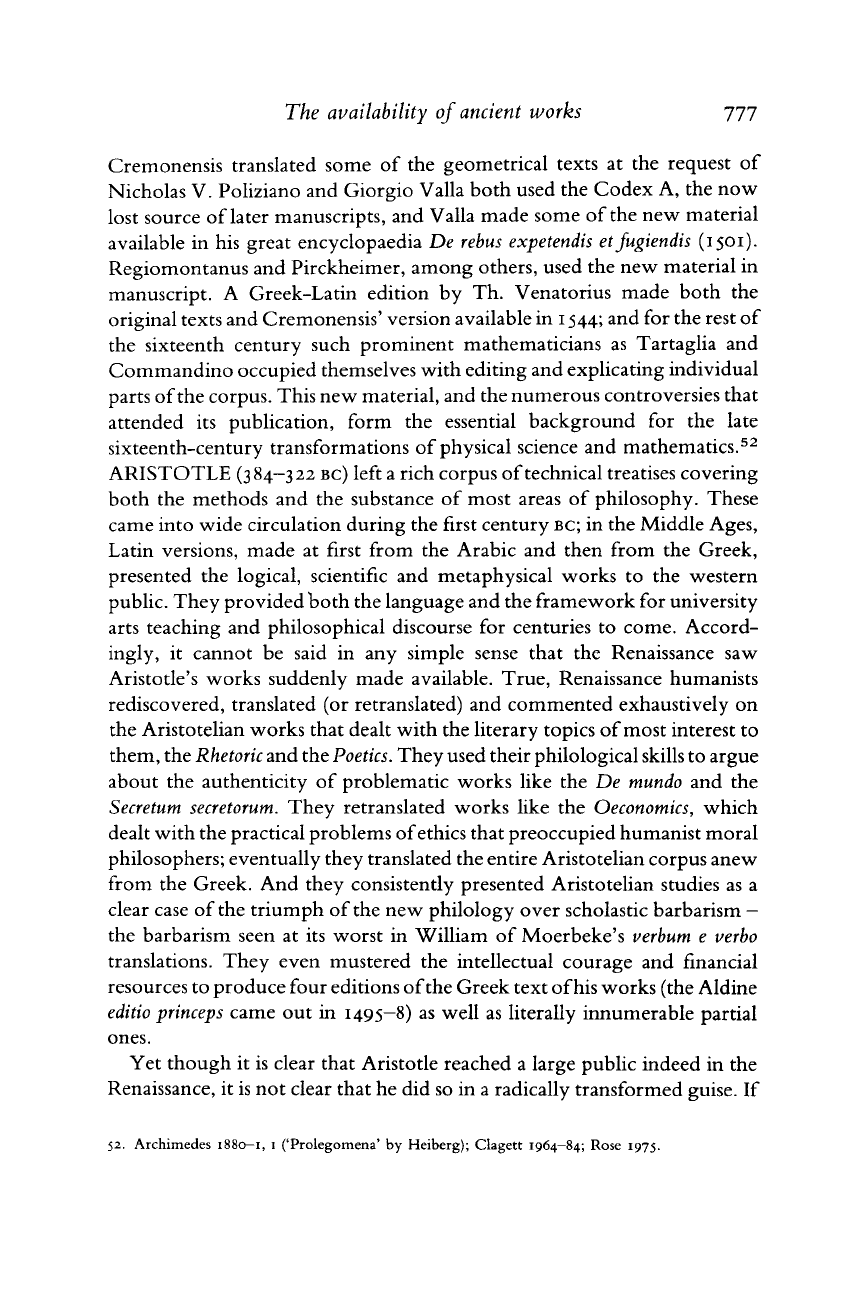
The
availability
of ancient works
111
Cremonensis
translated
some of the geometrical texts at the request of
Nicholas
V. Poliziano and Giorgio
Valla
both used the Codex A, the now
lost source of later manuscripts, and
Valla
made some of the new material
available
in his great encyclopaedia De
rebus expetendis et fugiendis
(1501).
Regiomontanus and Pirckheimer, among others, used the new material in
manuscript. A Greek-Latin edition by Th. Venatorius made both the
original texts and Cremonensis' version available in
1544;
and for the rest of
the sixteenth century such prominent mathematicians as Tartaglia and
Commandino occupied themselves with editing and explicating individual
parts
of
the corpus. This new material, and the numerous controversies
that
attended its publication, form the essential background for the late
sixteenth-century transformations of physical science and mathematics.
52
ARISTOTLE
(384-322
BC)
left a rich corpus
of
technical treatises covering
both the methods and the substance of most areas of philosophy. These
came into wide circulation during the first century
BC;
in the Middle
Ages,
Latin versions, made at first from the Arabic and
then
from the Greek,
presented the
logical,
scientific and metaphysical works to the western
public. They provided both the language and the framework for university
arts
teaching and philosophical discourse for centuries to come.
Accord-
ingly,
it cannot be said in any simple sense
that
the Renaissance saw
Aristotle's
works suddenly made available. True, Renaissance humanists
rediscovered,
translated
(or
retranslated)
and commented exhaustively on
the Aristotelian works
that
dealt with the literary topics
of
most interest to
them, the
Rhetoric
and the
Poetics.
They used their
philological
skills
to argue
about the authenticity of problematic works like the De
mundo
and the
Secretum
secretorum.
They
retranslated
works like the
Oeconomics,
which
dealt with the practical problems
of
ethics
that
preoccupied humanist moral
philosophers; eventually they
translated
the
entire
Aristotelian corpus anew
from the Greek. And they consistently presented Aristotelian studies as a
clear case of the
triumph
of the new philology over scholastic barbarism
—
the barbarism seen at its worst in William of Moerbeke's
verbum
e
verbo
translations. They even mustered the intellectual courage and financial
resources to produce four editions
of
the Greek text
of
his works (the Aldine
editio
princeps
came out in 1495-8) as
well
as literally innumerable partial
ones.
Yet
though it is clear
that
Aristotle reached a large public indeed in the
Renaissance, it is not clear
that
he did so in a radically transformed guise. If
52.
Archimedes 1880-1, 1 ('Prolegomena' by Heiberg); Clagett 1964-84; Rose 1975.
Cambridge Histories Online © Cambridge University Press, 2008
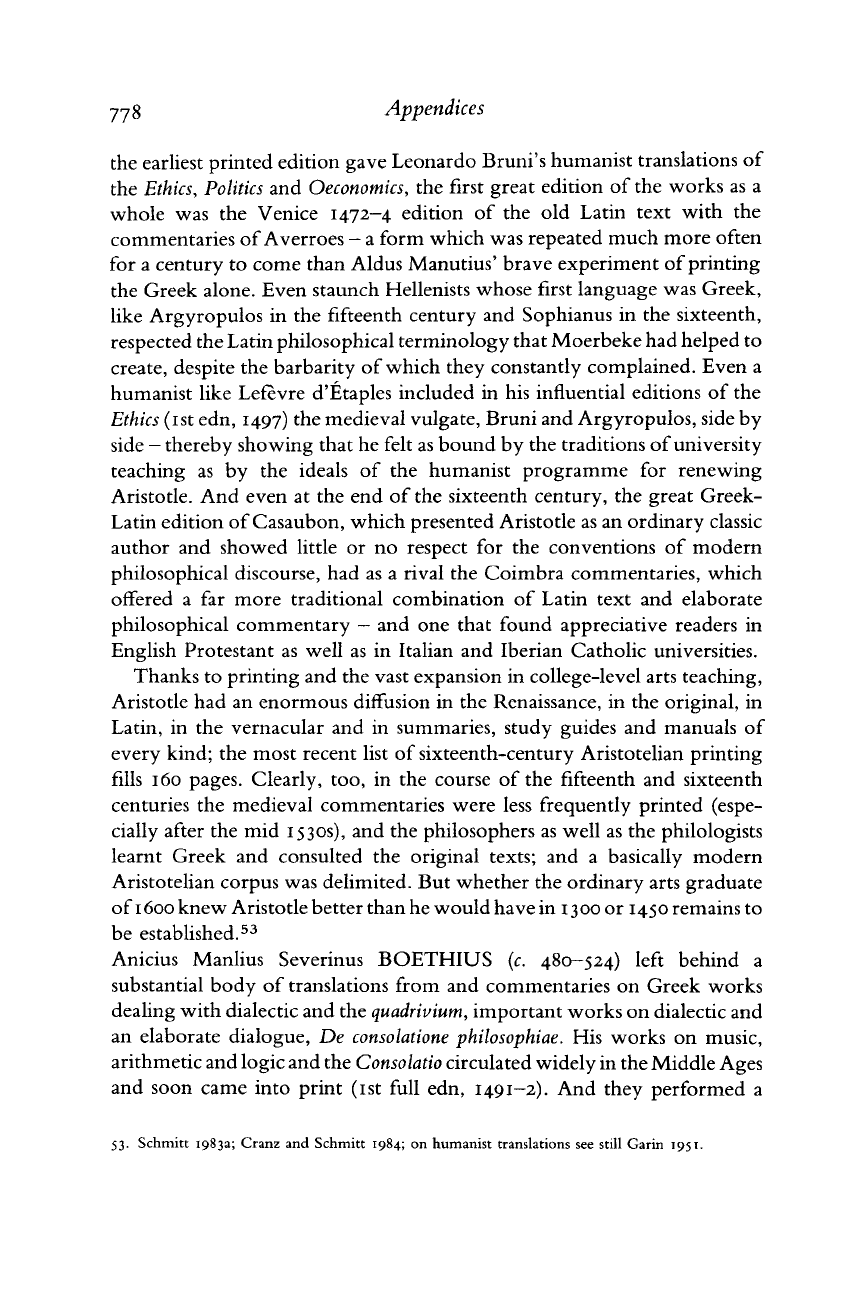
778
Appendices
the earliest
printed
edition gave Leonardo Bruni's humanist translations of
the
Ethics,
Politics
and
Oeconomics,
the first great edition of the works as a
whole
was the Venice
1472-4
edition of the old Latin text with the
commentaries of
Averroes
—
a form which was repeated much more often
for
a century to come
than
Aldus Manutius' brave experiment of printing
the Greek alone. Even staunch Hellenists whose first language was Greek,
like
Argyropulos in the fifteenth century and Sophianus in the sixteenth,
respected the Latin philosophical terminology
that
Moerbeke had helped to
create, despite the barbarity of which they constantly complained. Even a
humanist like Lefevre d'Etaples included in his influential editions of the
Ethics
(1st edn, 1497) the medieval vulgate, Bruni and
Argyropulos,
side by
side
—
thereby showing
that
he felt as bound by the traditions
of
university
teaching as by the ideals of the humanist programme for renewing
Aristotle.
And even at the end of the sixteenth century, the great Greek-
Latin edition of Casaubon, which presented Aristotle as an ordinary classic
author
and showed little or no respect for the conventions of modern
philosophical discourse, had as a rival the Coimbra commentaries, which
offered
a far more traditional combination of Latin text and elaborate
philosophical commentary
—
and one
that
found appreciative readers in
English
Protestant
as
well
as in Italian and Iberian Catholic universities.
Thanks to printing and the vast expansion in
college-level
arts
teaching,
Aristotle
had an enormous diffusion in the Renaissance, in the original, in
Latin, in the vernacular and in summaries, study guides and manuals of
every
kind; the most recent list of sixteenth-century Aristotelian printing
fills
160 pages. Clearly, too, in the course of the fifteenth and sixteenth
centuries the medieval commentaries were less frequently
printed
(espe-
cially
after the mid 1530s), and the philosophers as
well
as the philologists
learnt Greek and consulted the original texts; and a basically modern
Aristotelian corpus was delimited. But whether the ordinary
arts
graduate
of
1600 knew Aristotle
better
than
he would have in 1300 or
1450
remains to
be established.
53
Anicius
Manlius Severinus BOETHIUS (c. 480—524) left behind a
substantial body of translations from and commentaries on Greek works
dealing with dialectic and the
quadrivium,
important
works on dialectic and
an elaborate dialogue, De
consolatione
philosophiae.
His works on music,
arithmetic and logic and the
Consolatio
circulated widely in the Middle
Ages
and soon came into
print
(1st full edn,
1491-2).
And they performed a
53.
Schmitt 1983a; Cranz and Schmitt 1984; on humanist translations see still Garin 1951.
Cambridge Histories Online © Cambridge University Press, 2008
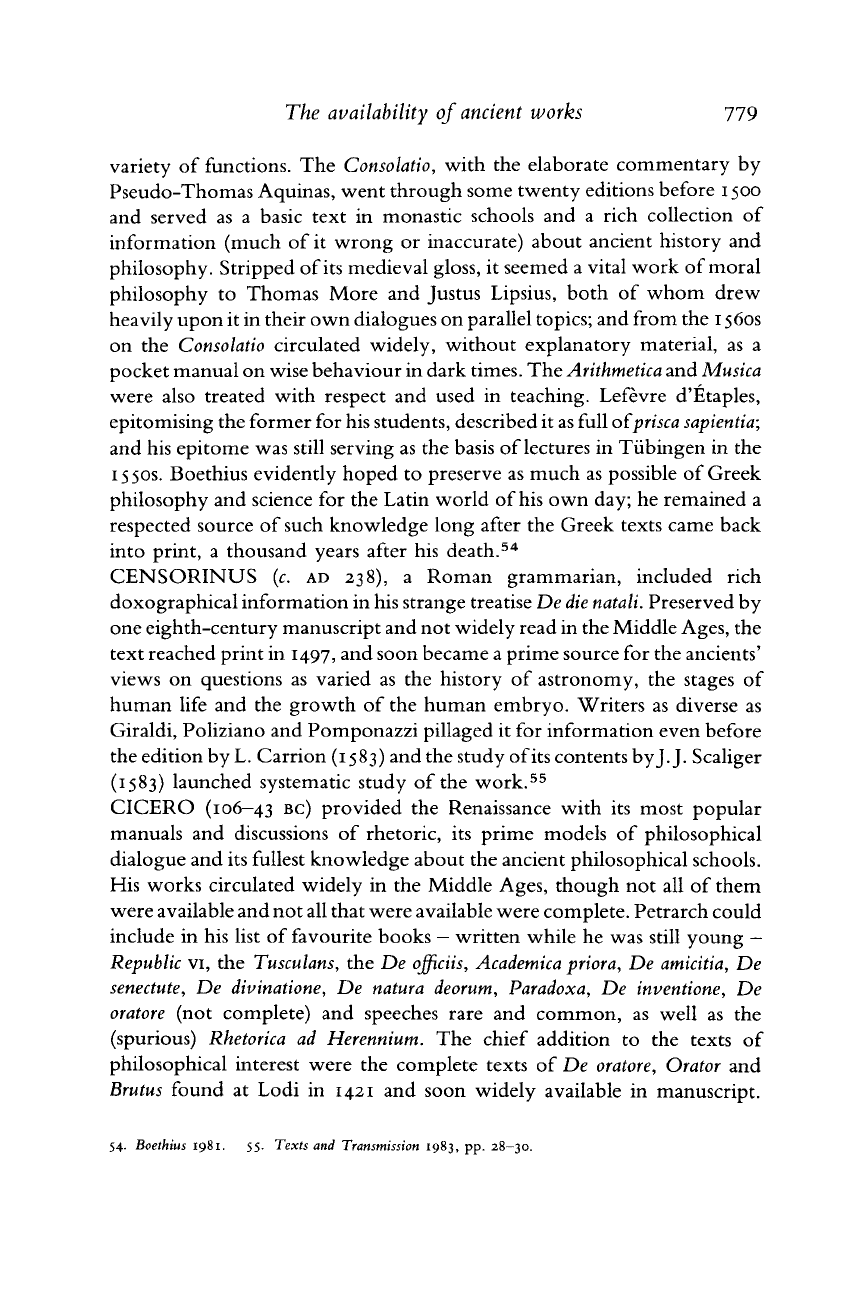
The
availability
of ancient works
779
variety of functions. The
Consolado,
with the elaborate commentary by
Pseudo-Thomas Aquinas, went through some twenty editions before 1500
and served as a basic text in monastic schools and a rich collection of
information (much of it wrong or inaccurate) about ancient history and
philosophy. Stripped
of
its medieval
gloss,
it seemed a vital work of moral
philosophy to Thomas More and
Justus
Lipsius, both of whom drew
heavily
upon it in their own dialogues on parallel topics; and from the 1560s
on the
Consolado
circulated widely, without explanatory material, as a
pocket
manual on wise behaviour in dark times. The
Arithmedca
and
Música
were also
treated
with respect and used in teaching. Lefévre d'Etaples,
epitomising the former for his students, described it as full
oiprisca sapienda;
and his epitome was still serving as the basis of lectures in Tubingen in the
1550s.
Boethius evidently hoped to preserve as much as possible of Greek
philosophy and science for the Latin world of his own day; he remained a
respected source of such knowledge long after the Greek texts came back
into
print,
a thousand years after his death.
54
CENSORINUS
(c. AD 238), a Roman grammarian, included rich
doxographical information in his strange treatise De
die
natali.
Preserved by
one eighth-century manuscript and not widely read in the Middle
Ages,
the
text reached
print
in
1497,
and soon became a prime source for the ancients'
views
on questions as varied as the history of astronomy, the stages of
human
life
and the growth of the human embryo. Writers as diverse as
Giraldi,
Poliziano and Pomponazzi pillaged it for information even before
the edition by L. Carrion (1583) and the study
of
its contents
byj.
J. Scaliger
(1583)
launched systematic study of the work.
55
CICERO
(106—43
BC)
provided the Renaissance with its most popular
manuals and discussions of rhetoric, its prime models of philosophical
dialogue and its fullest knowledge about the ancient philosophical schools.
His works circulated widely in the Middle
Ages,
though not all of them
were available and not all
that
were available were complete. Petrarch could
include in his list of favourite books
—
written while he was still young
—
Republic
vi, the
Tusculans,
the De officiis, Académica priora, De amicida, De
senectute,
De divinadone, De natura
deorum,
Paradoxa, De invendone, De
oratore
(not complete) and speeches
rare
and common, as
well
as the
(spurious)
Rhetorica
ad
Herennium.
The
chief
addition to the texts of
philosophical interest were the complete texts of De
oratore,
Orator
and
Brutus
found at Lodi in 1421 and soon widely available in manuscript.
54.
Boethius 1981. 55. Texts and Transmission 1983, pp. 28-30.
Cambridge Histories Online © Cambridge University Press, 2008
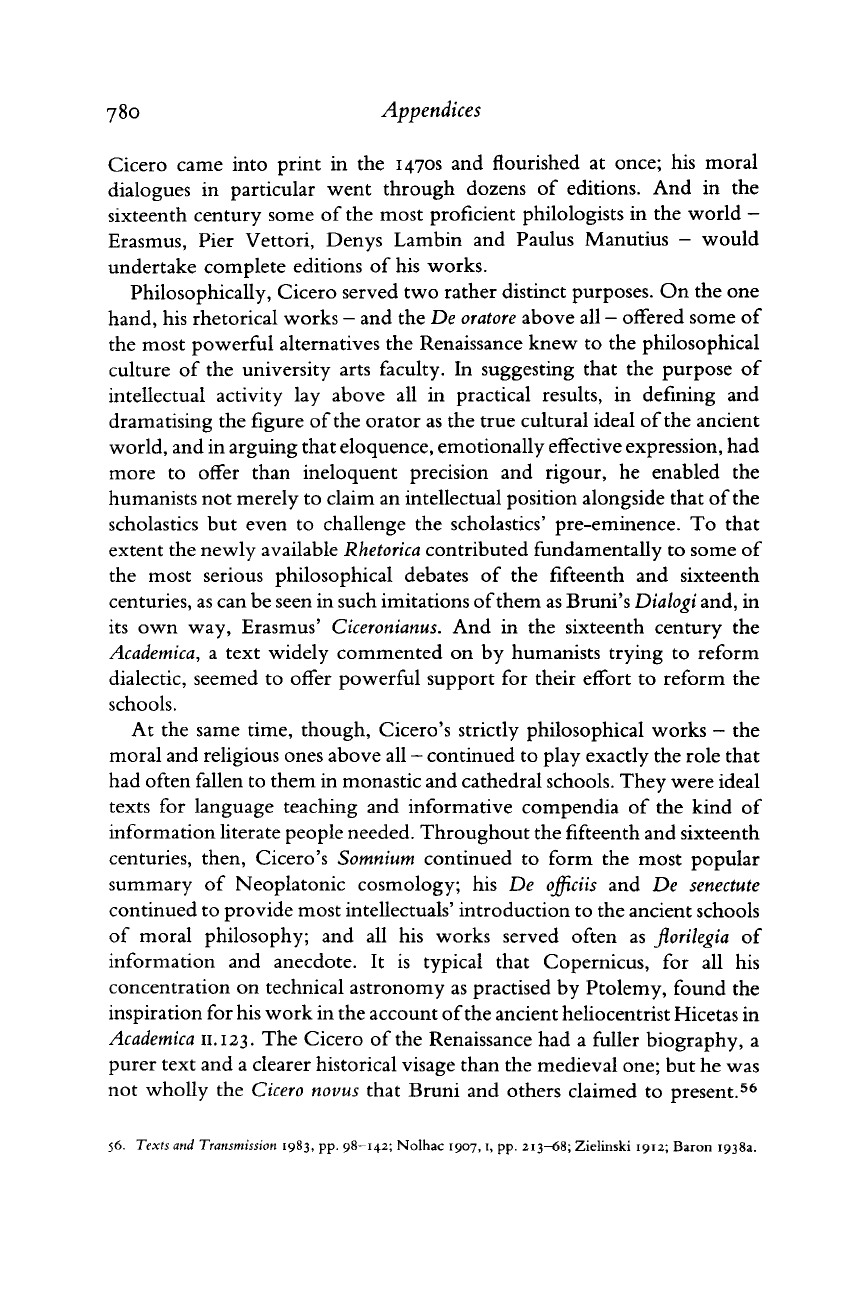
78o
Appendices
Cicero
carne into
print
in the 1470s and flourished at once; his moral
dialogues
in particular went through dozens of editions. And in the
sixteenth century some of the most proficient philologists in the world -
Erasmus, Pier Vettori, Denys Lambin and Paulus Manutius - would
undertake complete editions of his works.
Philosophically,
Cicero served two
rather
distinct purposes. On the one
hand,
his rhetorical works - and the De
oratore
above all - offered some of
the most powerful alternatives the Renaissance knew to the philosophical
culture of the university
arts
faculty. In suggesting
that
the purpose of
intellectual activity lay above all in practical results, in defining and
dramatising the figure
of
the orator as the
true
cultural ideal
of
the ancient
world,
and in arguing
that
eloquence, emotionally effective expression, had
more to offer
than
ineloquent precision and rigour, he enabled the
humanists not merely to claim an intellectual position alongside
that
of
the
scholastics
but even to challenge the scholastics' pre-eminence. To
that
extent the newly available
Rhetorica
contributed fundamentally to some of
the most serious philosophical debates of the fifteenth and sixteenth
centuries, as can be seen in such imitations
of
them as Bruni's
Dialogi
and, in
its own way, Erasmus'
Ciceronianus.
And in the sixteenth century the
Académica,
a text widely commented on by humanists trying to reform
dialectic,
seemed to offer powerful support for their effort to reform the
schools.
At
the same time, though, Cicero's strictly philosophical works
—
the
moral and religious ones above all
—
continued to play exactly the role
that
had often fallen to them in monastic and cathedral
schools.
They were ideal
texts for language teaching and informative compendia of the kind of
information literate people needed. Throughout the fifteenth and sixteenth
centuries,
then,
Cicero's
Somnium
continued to form the most popular
summary of Neoplatonic cosmology; his De
officiis
and De
senectute
continued to provide most intellectuals' introduction to the ancient schools
of
moral philosophy; and all his works served often as
jiorilegia
of
information and anecdote. It is typical
that
Copernicus, for all his
concentration on technical astronomy as practised by Ptolemy, found the
inspiration for his work in the account
of
the ancient heliocentrist Hicetas in
Académica 11.123.
The Cicero of the Renaissance had a fuller biography, a
purer
text and a clearer historical visage
than
the medieval one; but he was
not wholly the
Cicero novus
that
Bruni and others claimed to present.
56
56.
Texts and Transmission 1983, pp. 98-142; Nolhac
1907,1,
pp.
213-68;
Zielinski
1912;
Baron 1938a.
Cambridge Histories Online © Cambridge University Press, 2008
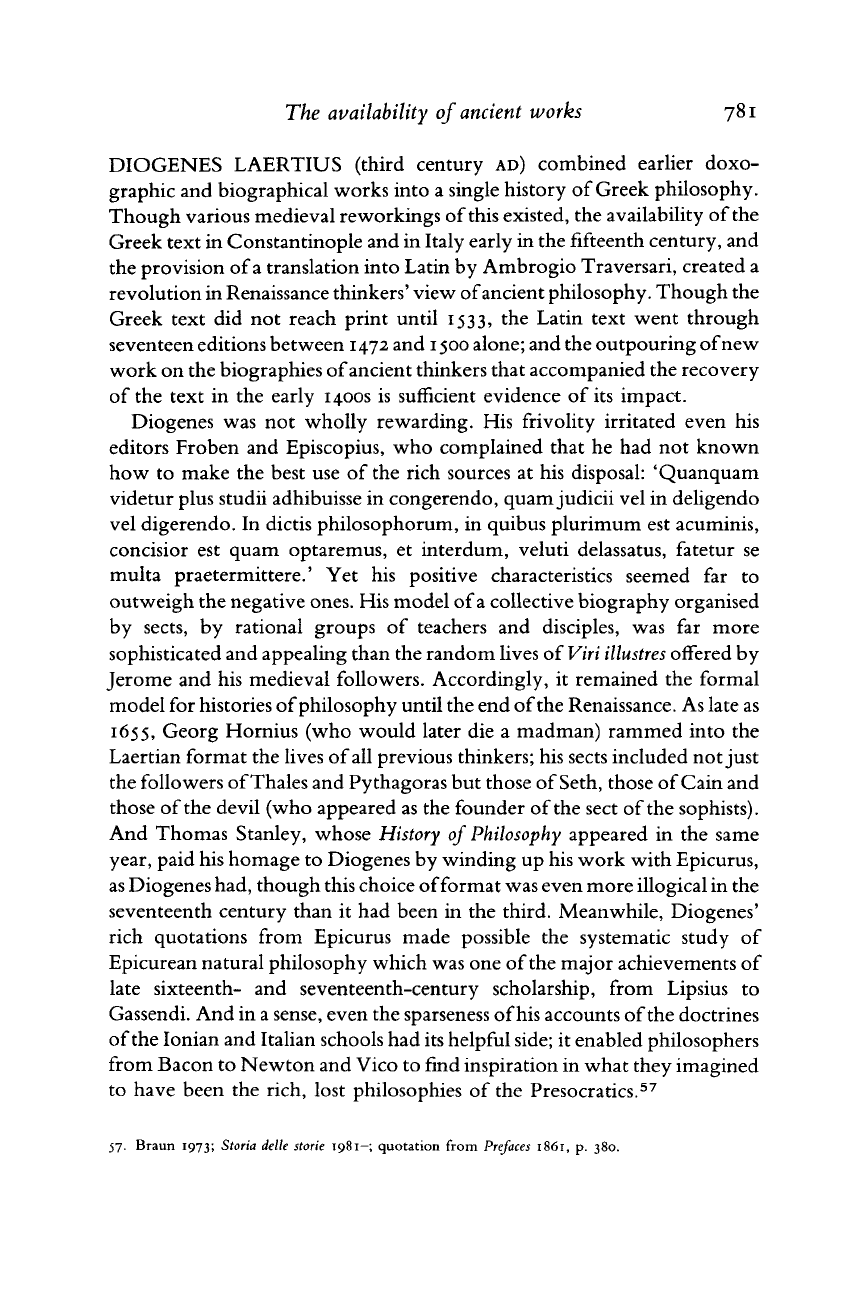
The
availability
of ancient works
DIOGENES
LAERTIUS
(third
century AD) combined earlier doxo-
graphic and biographical works into a single history
of
Greek
philosophy.
Though
various medieval re
workings
of
this existed, the availability
of
the
Greek
text in Constantinople and in Italy early in the fifteenth century, and
the provision
of
a translation into Latin by Ambrogio Traversari, created a
revolution in Renaissance thinkers'
view
of
ancient philosophy. Though the
Greek
text did not reach
print
until 1533, the Latin text went through
seventeen editions between
1472
and 1500 alone; and the outpouring
of
new
work
on the biographies
of
ancient thinkers
that
accompanied the recovery
of
the text in the early 1400s is sufficient evidence of its impact.
Diogenes
was not wholly rewarding. His frivolity
irritated
even his
editors Froben and Episcopius, who complained
that
he had not known
how
to make the best use of the rich sources at his disposal: 'Quanquam
videtur plus studii adhibuisse in congerendo, quam
judicii
vel in deligendo
vel
digerendo. In dictis philosophorum, in quibus plurimum est acuminis,
concisior
est quam optaremus, et interdum, veluti delassatus, fatetur se
multa praetermittere.' Yet his positive characteristics seemed far to
outweigh
the negative ones. His model
of
a
collective
biography organised
by
sects, by rational groups of teachers and disciples, was far more
sophisticated and appealing
than
the random lives of
Viri
illustres
offered by
Jerome
and his medieval followers. Accordingly, it remained the formal
model for histories
of
philosophy until the end
of
the Renaissance. As late as
1655,
Georg Hornius (who would later die a madman) rammed into the
Laertian format the lives
of
all
previous thinkers; his sects included not just
the followers
of
Thales
and Pythagoras but those
of
Seth, those
of
Cain
and
those
of
the devil (who appeared as the founder
of
the sect
of
the sophists).
And
Thomas Stanley, whose
History
of
Philosophy
appeared in the same
year, paid his homage to Diogenes by winding up his work with Epicurus,
as Diogenes had, though this choice
of
format was even more
illogical
in the
seventeenth century
than
it had been in the
third.
Meanwhile, Diogenes'
rich quotations from Epicurus made possible the systematic study of
Epicurean
natural
philosophy which was one
of
the major achievements of
late sixteenth- and seventeenth-century scholarship, from Lipsius to
Gassendi. And in a sense, even the sparseness
of
his accounts
of
the doctrines
of
the Ionian and Italian schools had its helpful side; it enabled philosophers
from Bacon to Newton and
Vico
to find inspiration in what they imagined
to have been the rich, lost philosophies of the Presocratics.
57
57.
Braun 1973; Storia delle storie
1981-;
quotation from Prefaces 1861, p. 380.
Cambridge Histories Online © Cambridge University Press, 2008
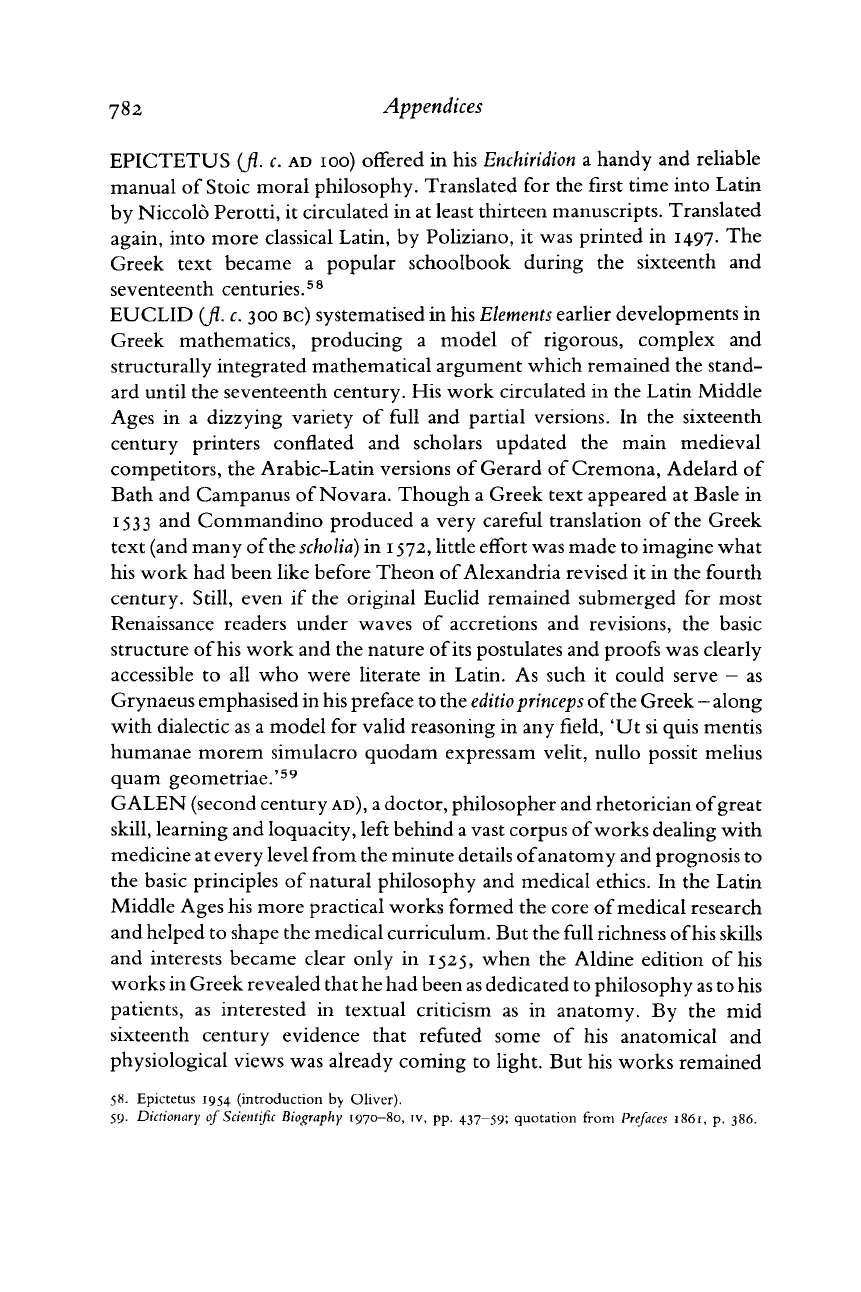
782
Appendices
EPICTETUS
{ft. c.
AD
100) offered in his
Enchiridion
a handy and reliable
manual of Stoic moral philosophy. Translated for the first time into Latin
by
Niccolo Perotti, it circulated in at least
thirteen
manuscripts. Translated
again, into more classical Latin, by Poliziano, it was
printed
in 1497. The
Greek
text became a popular schoolbook during the sixteenth and
seventeenth centuries.
5
8
EUCLID
(fi. c. 300
BC)
systematised in his
Elements
earlier developments in
Greek
mathematics, producing a model of rigorous, complex and
structurally integrated mathematical argument which remained the
stand-
ard until the seventeenth century. His work circulated in the Latin Middle
Ages
in a dizzying variety of full and partial versions. In the sixteenth
century
printers
conflated and scholars updated the main medieval
competitors, the Arabic-Latin versions of Gerard of Cremona, Adelard of
Bath and Campanus
of
Novara.
Though a Greek text appeared at Basle in
1533
and Commandino produced a very careful translation of the Greek
text (and many
of
the
scholia)
in
1572,
little effort was made to imagine what
his work had been like before Theon
of
Alexandria
revised it in the fourth
century.
Still,
even if the original Euclid remained submerged for most
Renaissance readers
under
waves of accretions and revisions, the basic
structure
of
his work and the
nature
of
its postulates and proofs was clearly
accessible
to all who were literate in Latin. As such it could serve
—
as
Grynaeus emphasised in his preface to the
editio
princeps of
the Greek
—
along
with
dialectic as a model for valid reasoning in any field, 'Ut si quis mentis
humanae morem simulacro quodam expressam velit, nullo possit melius
quam geometriae.'
59
GALEN
(second century
AD),
a doctor, philosopher and rhetorician
of
great
skill,
learning and loquacity, left behind a vast corpus
of
works
dealing with
medicine at every
level
from the minute details
of
anatomy and prognosis to
the basic principles of
natural
philosophy and medical ethics. In the Latin
Middle
Ages
his more practical works formed the core
of
medical research
and helped to shape the medical curriculum. But the full richness
of
his skills
and interests became clear only in 1525, when the Aldine edition of his
works
in Greek revealed
that
he had been as dedicated to philosophy as to his
patients, as interested in textual criticism as in anatomy. By the mid
sixteenth century evidence
that
refuted some of his anatomical and
physiological
views
was already coming to light. But his works remained
58.
Epictetus 1954 (introduction by
Oliver).
59.
Dictionary of Scientific Biography 1970-80, iv, pp.
437-59;
quotation from Prefaces 1861, p. 386.
Cambridge Histories Online © Cambridge University Press, 2008
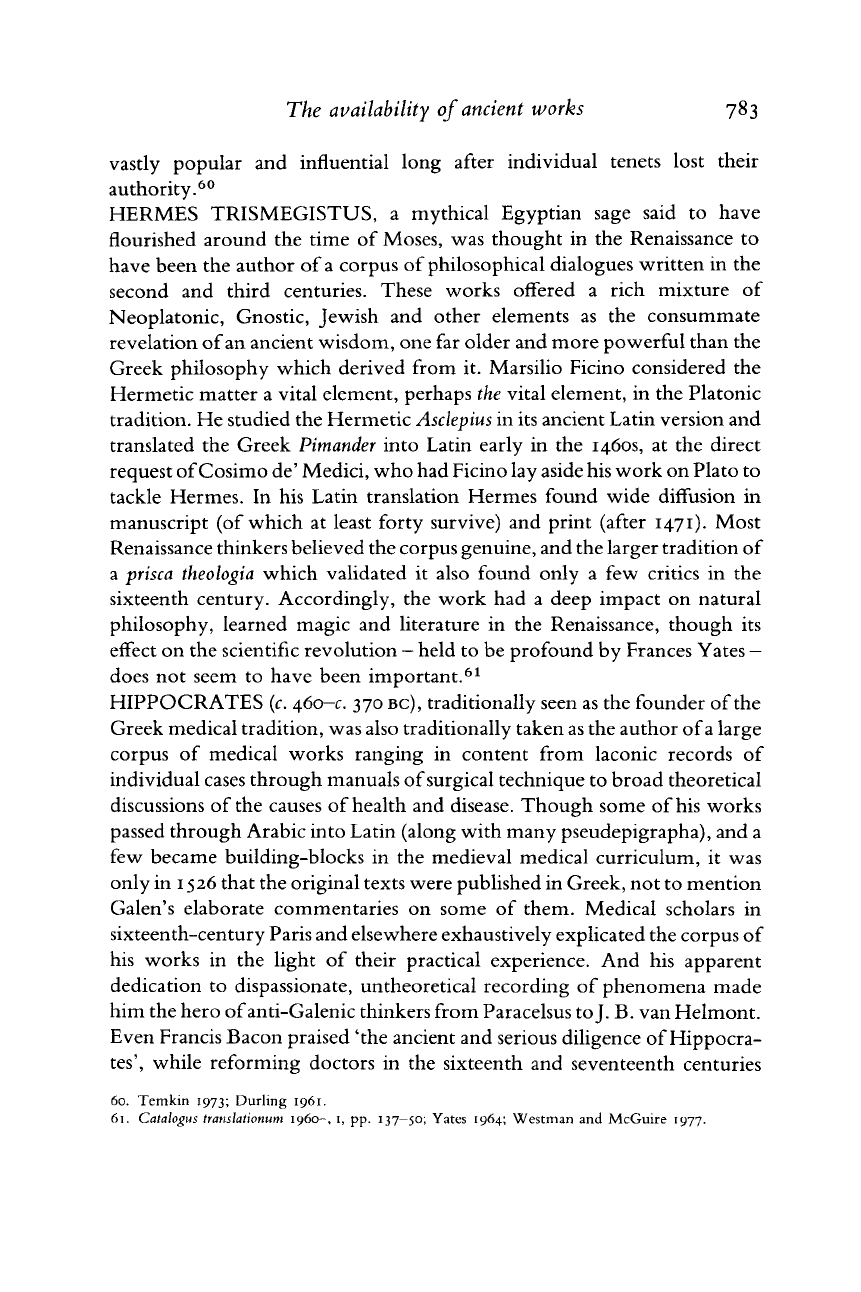
The
availability
of ancient works
783
vastly
popular and influential long after individual
tenets
lost their
authority.
60
HERMES
TRISMEGISTUS,
a mythical Egyptian sage said to have
flourished around the time of Moses, was thought in the Renaissance to
have been the
author
of a corpus of philosophical dialogues written in the
second and
third
centuries. These works offered a rich mixture of
Neoplatonic, Gnostic, Jewish and other elements as the consummate
revelation
of
an ancient wisdom, one far older and more powerful
than
the
Greek
philosophy which derived from it. Marsilio Ficino considered the
Hermetic
matter
a vital element, perhaps the vital element, in the Platonic
tradition. He studied the Hermetic
Asclepius
in its ancient Latin version and
translated
the Greek
Pimander
into Latin early in the 1460s, at the direct
request
of
Cosimo
de' Medici, who had Ficino lay aside his work on Plato to
tackle Hermes. In his Latin translation Hermes found wide diffusion in
manuscript (of which at least forty survive) and
print
(after
1471).
Most
Renaissance thinkers believed the corpus genuine, and the larger tradition of
a
prisca theologia
which validated it also found only a few critics in the
sixteenth century. Accordingly, the work had a deep impact on
natural
philosophy, learned magic and
literature
in the Renaissance, though its
effect
on the scientific revolution
—
held to be profound by Frances
Yates
—
does not seem to have been
important.
61
HIPPOCRATES
(c.
460-c. 370
BC),
traditionally seen as the founder
of
the
Greek
medical tradition, was also traditionally taken as the
author
of
a large
corpus of medical works ranging in content from laconic records of
individual cases through manuals
of
surgical
technique to broad theoretical
discussions of the causes of health and disease. Though some of his works
passed through Arabic into Latin (along with many pseudepigrapha), and a
few
became building-blocks in the medieval medical curriculum, it was
only
in 1526
that
the original texts were published in Greek, not to mention
Galen's
elaborate commentaries on some of them. Medical scholars in
sixteenth-century Paris and elsewhere exhaustively explicated the corpus of
his works in the light of their practical experience. And his
apparent
dedication to dispassionate, untheoretical recording of phenomena made
him the hero
of
anti-Galenic thinkers from Paracelsus to J. B. van Helmont.
Even
Francis Bacon praised
4
the
ancient and serious diligence
of
Hippocra-
tes', while reforming doctors in the sixteenth and seventeenth centuries
60. Temkin 1973; Durling 1961.
61.
Catalogus translationum
1960-,
1, pp.
137-50;
Yates
1964; Westman and McGuire 1977.
Cambridge Histories Online © Cambridge University Press, 2008
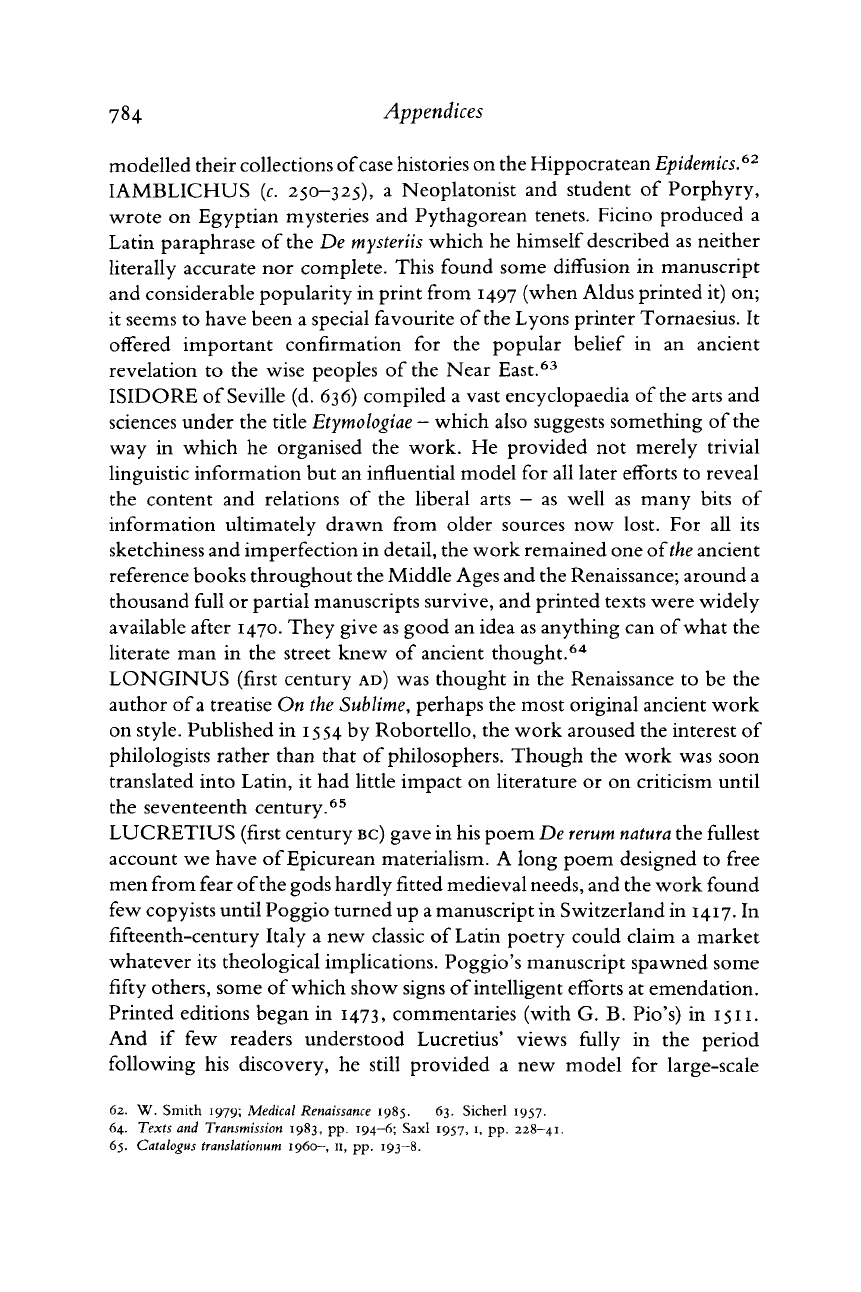
Appendices
modelled their collections
of
case histories on the Hippocratean
Epidemics.
62
IAMBLICHUS
(c. 250-325), a Neoplatonist and
student
of Porphyry,
wrote on Egyptian mysteries and Pythagorean tenets. Ficino produced a
Latin
paraphrase
of the De
mysteriis
which he himself described as neither
literally accurate nor complete. This found some diffusion in manuscript
and considerable popularity in
print
from 1497 (when Aldus
printed
it) on;
it seems to have been a special favourite
of
the Lyons
printer
Tornaesius. It
offered
important
confirmation for the popular
belief
in an ancient
revelation to the wise peoples of the Near East.
63
ISIDORE
of
Seville
(d. 636) compiled a vast encyclopaedia of the
arts
and
sciences
under
the title
Etymologiae
- which also suggests something of the
way
in which he organised the work. He provided not merely trivial
linguistic information but an influential model for all later efforts to reveal
the content and relations of the liberal
arts
—
as
well
as many bits of
information ultimately drawn from older sources now lost. For all its
sketchiness and imperfection in detail, the work remained one
of the
ancient
reference books throughout the Middle
Ages
and the Renaissance; around a
thousand full or partial manuscripts survive, and
printed
texts were widely
available
after 1470. They
give
as good an idea as anything can
of
what the
literate man in the street knew of ancient thought.
64
LONGINUS
(first century
AD)
was thought in the Renaissance to be the
author
of
a treatise On the
Sublime,
perhaps the most original ancient work
on style. Published in
1554
by Robortello, the work aroused the interest of
philologists
rather
than
that
of philosophers. Though the work was soon
translated
into Latin, it had little impact on
literature
or on criticism until
the seventeenth century.
65
LUCRETIUS
(first century
BC)
gave in his poem De
rerum natura
the fullest
account we have of Epicurean materialism. A long poem designed to free
men from fear
of
the gods hardly fitted medieval needs, and the work found
few
copyists until Poggio
turned
up a manuscript in Switzerland in
1417.
In
fifteenth-century Italy a new classic of Latin poetry could claim a market
whatever its theological implications. Poggio's manuscript spawned some
fifty
others, some of which show signs
of
intelligent efforts at emendation.
Printed editions began in 1473, commentaries (with G. B. Pio's) in
1511.
And
if few readers understood Lucretius'
views
fully in the period
following
his discovery, he still provided a new model for large-scale
62.
W. Smith 1979; Medical Renaissance 1985. 63. Sicherl 1957.
64.
Texts and Transmission 1983, pp.
194-6;
Saxl
1957, 1, pp. 228-41.
65.
Catalogus translationum i960-, II, pp.
193-8.
Cambridge Histories Online © Cambridge University Press, 2008
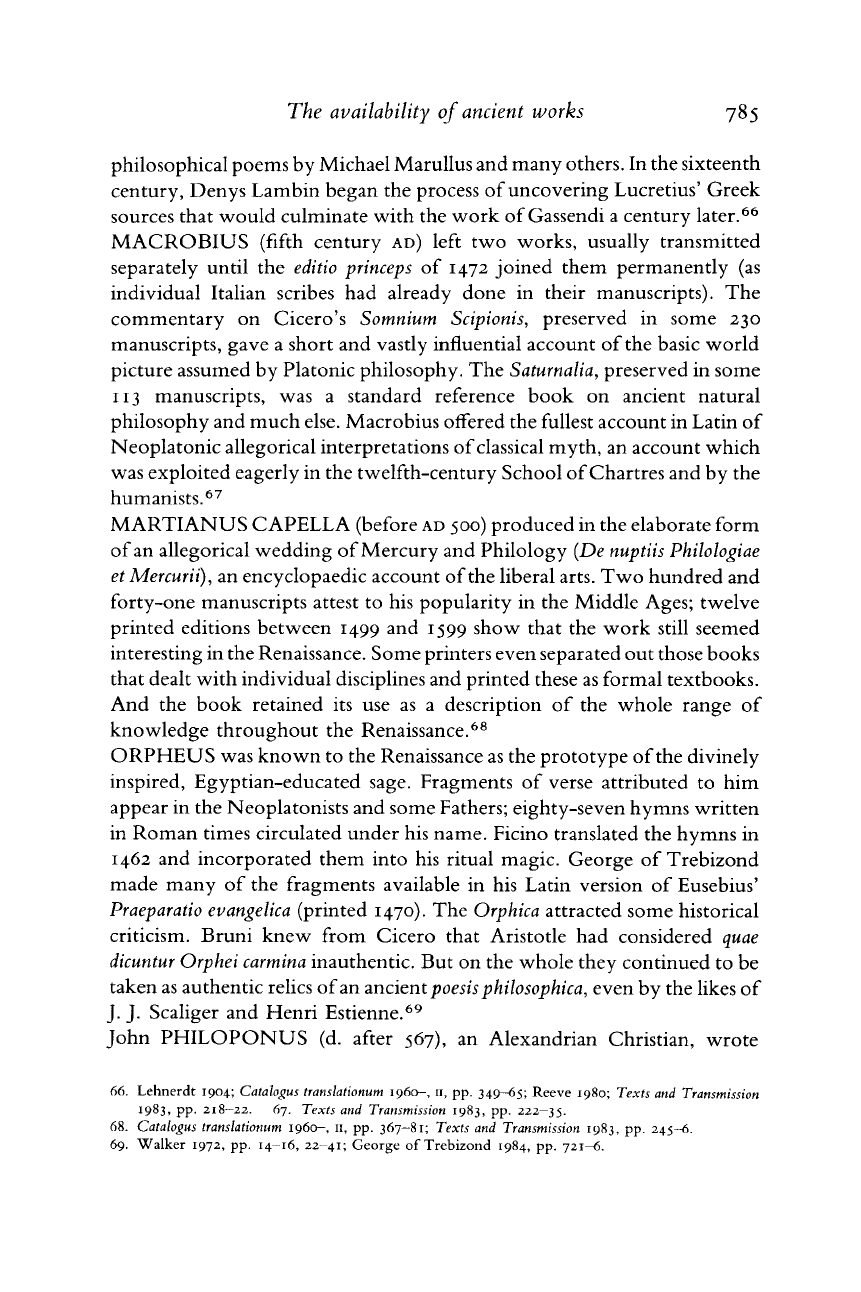
The
availability
of ancient works
785
philosophical poems by Michael Marullus and many others. In the sixteenth
century, Denys Lambin began the process of uncovering Lucretius' Greek
sources
that
would culminate with the work
of
Gassendi a century later.
66
MACROBIUS
(fifth century
AD)
left two works, usually transmitted
separately until the
editio
princeps
of 1472 joined them permanently (as
individual Italian scribes had already done in their manuscripts). The
commentary on Cicero's
Somnium Scipionis,
preserved in some 230
manuscripts, gave a short and vastly influential account of the basic world
picture assumed by Platonic philosophy. The
Saturnalia,
preserved in some
113
manuscripts, was a standard reference book on ancient natural
philosophy and much
else.
Macrobius offered the fullest account in Latin of
Neoplatonic allegorical interpretations
of
classical
myth, an account which
was
exploited eagerly in the twelfth-century School
of
Chartres and by the
humanists.
67
MARTIANUS
CAPELLA
(before
AD
500) produced in the elaborate form
of
an allegorical wedding
of
Mercury and Philology (De
nuptiis
Philologiae
et Mercurii),
an encyclopaedic account
of
the liberal arts. Two hundred and
forty-one manuscripts attest to his popularity in the Middle
Ages;
twelve
printed editions between 1499 and 1599 show
that
the work still seemed
interesting in the Renaissance. Some
printers
even separated out those books
that
dealt with individual disciplines and printed these as formal textbooks.
And
the book retained its use as a description of the whole range of
knowledge
throughout the Renaissance.
68
ORPHEUS
was known to the Renaissance as the prototype
of
the divinely
inspired, Egyptian-educated sage. Fragments of verse attributed to him
appear in the Neoplatonists and some Fathers; eighty-seven hymns written
in Roman times circulated under his name. Ficino translated the hymns in
1462
and incorporated them into his ritual magic. George of Trebizond
made many of the fragments available in his Latin version of Eusebius'
Praeparatio evangelica
(printed
1470).
The
Orphica
attracted some historical
criticism. Bruni knew from Cicero
that
Aristotle had considered
quae
dicuntur
Orphei carmina
inauthentic. But on the whole they continued to be
taken as authentic relics
of
an ancient
poesis philosophica,
even by the likes of
J. J. Scaliger and Henri Estienne.
69
John
PHILOPONUS (d. after 567), an Alexandrian Christian, wrote
66.
Lehnerdt 1904; Catalogus translationum i960-,
11,
pp. 349-65;
Reeve
1980; Texts and Transmission
1983,
pp.
218-22.
67. Texts and Transmission 1983, pp. 222-35.
68. Catalogus translationum i960-,
11,
pp.
367-81;
Texts and Transmission 1983, pp. 245-6.
69.
Walker 1972, pp.
14-16,
22-41;
George of Trebizond 1984, pp.
721-6.
Cambridge Histories Online © Cambridge University Press, 2008
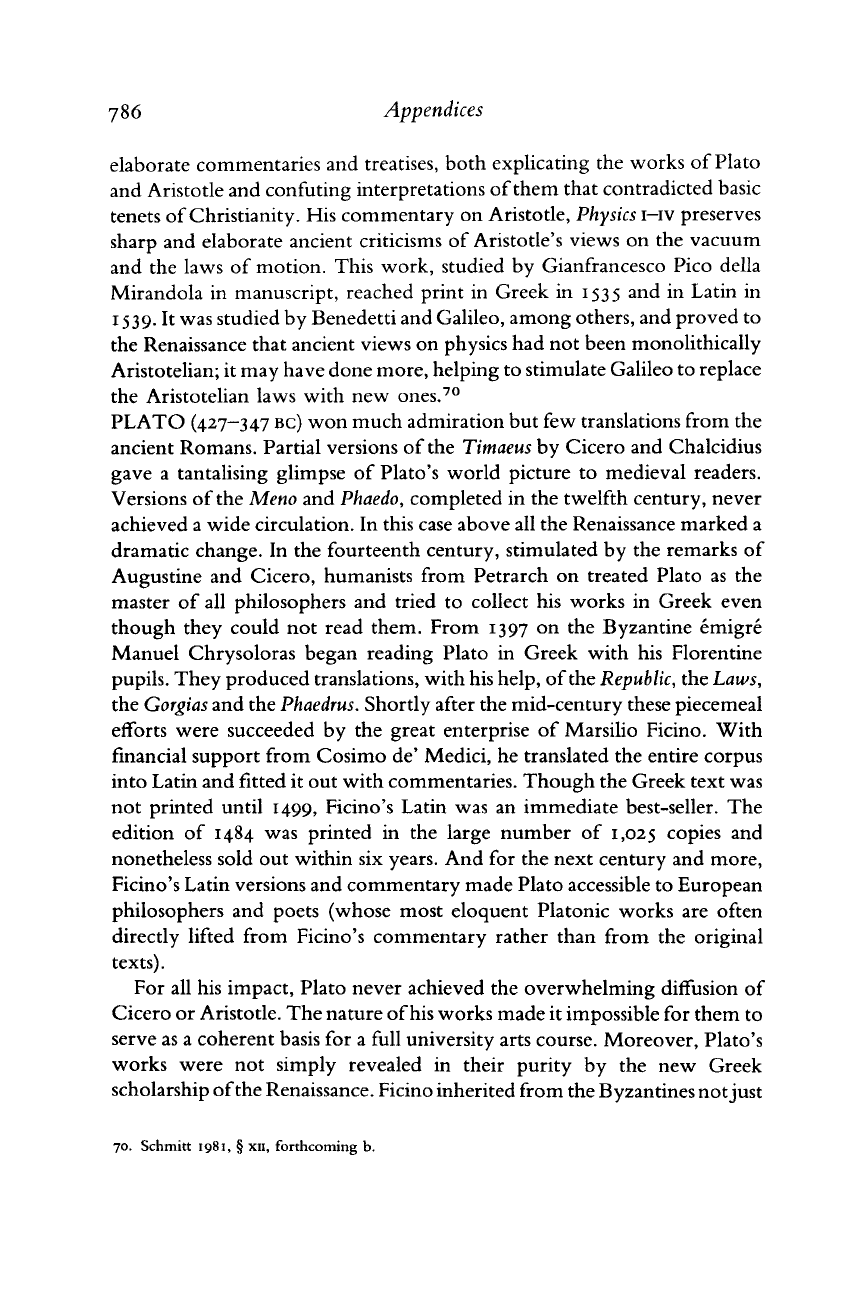
786
Appendices
elaborate commentaries and treatises, both explicating the works of Plato
and Aristotle and confuting
interpretations
of
them
that
contradicted basic
tenets
of Christianity. His commentary on Aristotle,
Physics
I-IV
preserves
sharp
and elaborate ancient criticisms of Aristotle's
views
on the vacuum
and the laws of motion. This work, studied by Gianfrancesco Pico della
Mirandola in manuscript, reached
print
in Greek in 1535 and in Latin in
1539.
It was studied by Benedetti and
Galileo,
among others, and proved to
the Renaissance
that
ancient
views
on physics had not been monolithically
Aristotelian; it may have done more, helping to stimulate Galileo to replace
the Aristotelian laws with new ones.
70
PLATO
(427-347
BC)
won much admiration but few translations from the
ancient Romans. Partial versions of the
Timaeus
by Cicero and Chalcidius
gave
a tantalising glimpse of Plato's world picture to medieval readers.
Versions
of
the
Meno
and
Phaedo,
completed in the twelfth century, never
achieved a wide circulation. In this case above all the Renaissance marked a
dramatic change. In the fourteenth century, stimulated by the remarks of
Augustine and
Cicero,
humanists from Petrarch on
treated
Plato as the
master of all philosophers and tried to collect his works in Greek even
though they could not read them. From 1397 on the Byzantine
émigré
Manuel Chrysoloras began reading Plato in Greek with his Florentine
pupils. They produced translations, with his help,
of
the
Republic,
the
Laws,
the
Gorgias
and the
Phaedrus.
Shortly after the mid-century these piecemeal
efforts were succeeded by the great enterprise of Marsilio Ficino. With
financial support from Cosimo
de' Medici, he
translated
the
entire
corpus
into Latin and fitted it out with commentaries. Though the Greek text was
not
printed
until 1499, Ficino's Latin was an immediate best-seller. The
edition of 1484 was
printed
in the large number of 1,025 copies and
nonetheless sold out within six years. And for the next century and more,
Ficino's Latin versions and commentary made Plato accessible to European
philosophers and poets (whose most eloquent Platonic works are often
directly lifted from Ficino's commentary
rather
than
from the original
texts).
For all his impact, Plato never achieved the overwhelming diffusion of
Cicero
or Aristotle. The
nature
of
his works made it impossible for them to
serve as a coherent basis for a full university
arts
course. Moreover, Plato's
works were not simply revealed in their purity by the new Greek
scholarship
of
the Renaissance. Ficino inherited from the Byzantines not just
70.
Schmitt
1981, § xii,
forthcoming
b.
Cambridge Histories Online © Cambridge University Press, 2008
